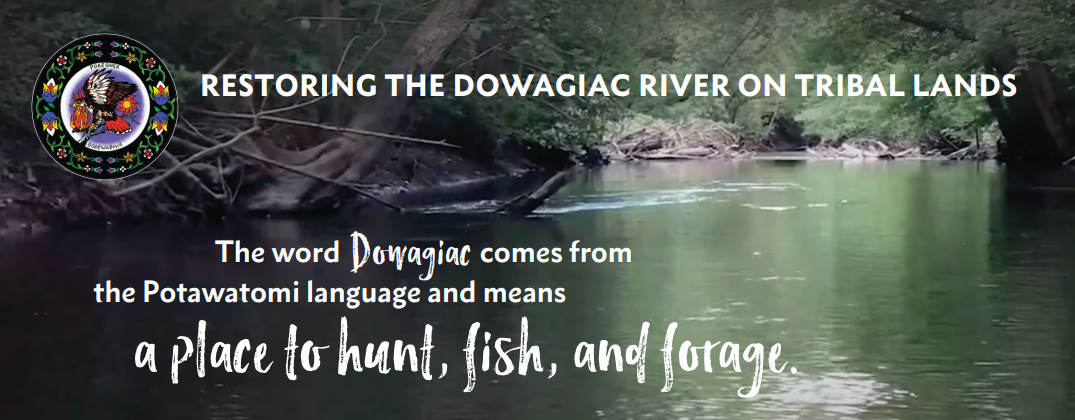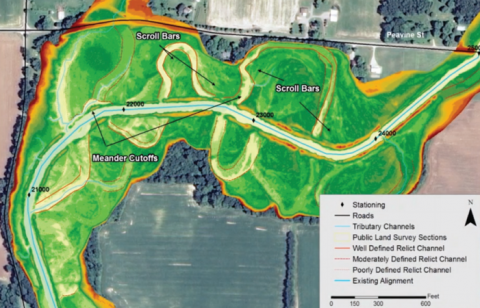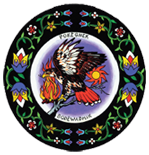
The Pokagon Band of Potawatomi Indians (“Pokagon Band”) has been working to restore historic meanders to a section of the Dowagiac River surrounded by tribal properties since 2011. The Dowagiac River was dredged, straightened, and disconnected from its floodplain in the early 1900’s. The Pokagon Band is seeking to reverse the negative effects of dredging and straightening within this section of the river and thus far the Pokagon Band has completed a feasibility study, LiDAR, NEPA EA evaluation, wetland assessment, hydraulic memo, has received an Army Corps of Engineers Nationwide Permit, has finalized a permit with MIEGLE and received a notice of authorization to begin construction, and developed 100% stamped, engineered drawings for Phase 1 and 100% stamped, engineered drawings for Phase 2. Several of these documents can be explored below as well as a virtual tour of the location and the PBS production, “Seven Generations River”, featuring the Dowagiac River. Meander restoration will increase the system’s resiliency, reduce turbidity, restore hydrological functioning, increase wetland acreage, double the length of the river in the project reach, and create more functional in-stream habitat. The restoration will benefit multiple species, including potamodromous fish, turtles, and waterfowl, and allow tribal citizens to fish from tribal properties for salmonid and non-salmonid migratory fish.
Since 2011, the Pokagon Band has been working to restore a stretch of the Dowagiac River where it runs through tribal land by returning its flow to the historic meander bends. The removal of the Pucker Street Dam downstream of the project has opened 159 miles of the Dowagiac River and its tributaries to migrating fish species including some from Lake Michigan, allowing Pokagon citizens to fish for these traditional food sources for the first time in almost a century. The remeandered stretch of the River will provide enhanced habitats for these fish and many other river and wetland species.

The Pokagon Band of Potawatomi Indians has lived in the vicinity of the Dowagiac River for hundreds of years because of the abundant natural resources. The Dowagiac, a coldwater river, had supported an active fishery on which many Pokagon citizens depended for food until it was dammed, dredged, and straightened in the early 1900’s, resulting in a degraded riverine system and loss of wetlands.
ACCOMPLISHMENTS THUS FAR
- Feasibility study
- A meandering configuration with no negative impact on neighboring lands during a 100-year storm event
- Wetland delineation
- Tribal Historic Preservation Office review
- Environmental assessment
- All necessary permitting and agreements
- Engineered drawings for project construction
- Phase 1 with restoration of two meander bends completed - Now in Maintenance Phase
- Phase 2 with restoration of three meander bends; 95% complete 09/28/2023
ECOLOGICAL BENEFITS
- Enhanced habitats for plant and animal species of cultural significance to the Pokagon Band
- More habitat niches for slow and fast flowing water species
- Niche habitats for migratory fish and needed spawning, feeding, and fry habitat
- Additional flood storage
- New wetland habitats
- Hydrology restored to approximately 53 acres of wetlands in the floodplain
- Reduced sedimentation in the River
- More resilience to climate change
- Progress toward the goals of multiple local, state, and regional conservation initiatives
For information regarding the current progress on the project please click here.
CONTACT: Kowabdanawa odë kė at (269) 782-9602 or PokagonDNR@PokagonBand-nsn.gov
Documents
